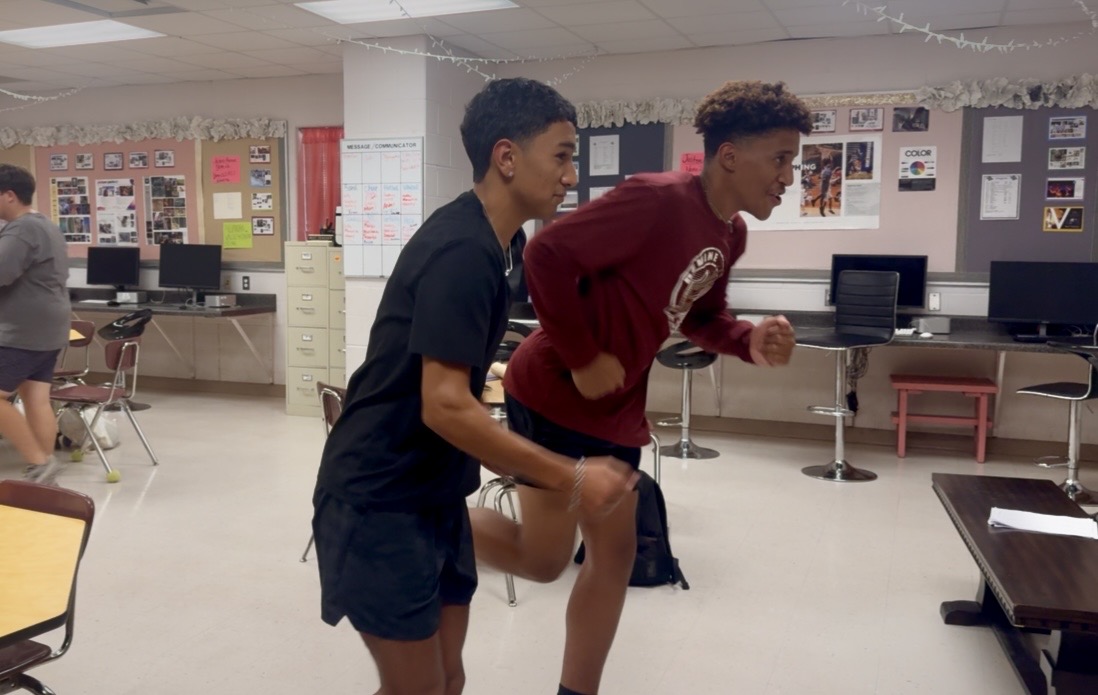In this special DHS News package, student journalists examine the recent shooting death of conservative commentator Charlie Kirk. The report includes a “man-on-the-street” segment featuring Devine High students who share their thoughts on the tragedy and how it shapes their views on free expression, safety, and open dialogue. The package concludes with an opinion feature by Senior Writer Maverick Beaty.
Charlie Kirk was one of the highest-profile conservatives, activists, and media personalities in the US. A trusted ally of President Donald Trump. On September 10, 2025, Charlie Kirk was an American right-wing activist, was fatally shot while speaking to an audience on the campus of Utah Valley University in Utah, United States. The outdoor event was on the first stop of the season for his American Comeback Tour, a speaking and debate series planned by Turning Point USA and the conservative organization he co-founded. While engaging with an audience member about mass shootings in the United States, Kirk was shot in the neck by a gunman positioned on the roof of a building approximately 142 yards away. He was pronounced dead at a nearby hospital.
ZACHERY GUERRA: All right, so today we’re here with Rowdy and Jacob.
ROWDY ESPARZA: I’ll be completely honest. I don’t think anybody deserves to get shot over political standings, and I just feel so bad for his two children and his wife. I think it was just so tragic that that happened to him. So at least he’s in heaven right now with our heavenly father.
ZACHERY GUERRA: How about you?
JACOB MCKEE: Just adding on to that, man. You really hit it on the nail. But really, the gun violence is just completely unnecessary over just political reasons and opinions. It just doesn’t need to happen. It’s a tragedy, man.
ZACHERY GUERRA: That’s very true. What do you think, Christian?
CHRISTIAN BEAVER: I think it was pretty sad in front of his wife and kids. You know, it’s messed up.
ZACHERY GUERRA: Yeah, that’s true. That’s true. What about you?
JACE ALEGRIA: I feel bad for his kids and everybody. When his kids look him up, that’s the first thing they’re going to see about his assassination and his death. And I don’t think that’s right. He was just speaking about his own opinion. And for him to speak his own opinion and to die for it, I don’t think that was right.
ZACHERY GUERRA: Yeah, that’s very true. Chris and Jay thought about it. Do you think it was justified that he was killed over his opinion?
CHRISTIAN GUTIERREZ: I don’t think anyone should get killed for having their own opinion on anything. That’s what I think about it. I don’t think it goes right at home.
ZACHERY GUERRA: What about you, Jay?
JACE MARTINEZ: You know, I don’t think he deserved to die. I don’t think it’s right that his wife and kids have to live with that. That’s not right. Especially over some opinions.
ZACHERY GUERRA: Let’s see what Alejandro, Christian, and Jace and Christian Beaver have to say about it. I don’t know. What did you think about it? Do you think it was deserved?
ALEJANDRO RAMIREZ: I don’t know. He did not deserve to die at all.
ZACHERY GUERRA: I agree with that, too.
ALEJANDRO RAMIREZ: I mean, he doesn’t deserve to die. You can make your own political decision.
ZACHERY GUERRA: Christian, what did you think about?
CHRISTIAN BEAVER: I thought he shouldn’t have gotten shot for his family, his kids, and just very sad.
CHRISTIAN ROSS: I don’t think anyone should be shot for their own opinion. It was pretty messed up.
ZACHERY GUERRA: Questions. I think it’s very sad that people just want to shoot somebody just cuz they want to support others that they don’t agree with.
The Warhorse Senior Writer Maverick Beaty’s Opinion feature:
On September 10, 2025, conservative political activist Charlie Kirk was fatally shot while speaking to an audience at Utah Valley University. 22-year-old suspect Tyler Robsinson was arrested two days later and is currently believed to be the only one involved in the shooting. The tragedy was filmed by several people who attended the event. Within minutes, the footage circulated all over social media, generating tens of millions of views across several digital platforms.
While there has been widespread condemnation of this attack, it didn’t take long for his murder to be heavily politicized. Kirk’s death has resulted in a wide variety of reactions that range from mourning to celebratory. Many right-leaning people feel outraged and disgusted that one of their most influential young political activists was publicly assassinated for using his right to free speech. Many left-leaning people feel completely unaffected by the attack and see Kirk’s death as the result of his own rhetoric. This, obviously, is a generalization, and most people across the political spectrum recognize this horrific event for what it actually was: another addition to the list of senseless gun violence that has been committed in America.
The assassination of Charlie Kirk is part of a broader, very unsettling trend: the normalization of political violence in American life. The viral spread of Kirk’s murder footage is emblematic of a digital age where violence isn’t just witnessed, it’s content. Within minutes, clips of the shooting spread across platforms like TikTok, Instagram, and Twitter. Live reactions, political commentary, and memes accompanied the clips.
In the wake of Kirk’s murder, violence has become a spectacle; it has become part of the public theater. Even by many of his critics, Kirk was known for maintaining a demeanor of debate over aggression. His death ironically highlights the collapse of that ideal. When speech turns into violence, we lose the tools that allow society to resolve conflict without resorting to bloodshed. This matters because political violence is self-perpetuating. It inspires copycats who want to be involved in the spectacle, and when we allow this kind of violence to persist, it invites the government to enact heavy-handed policies.
Charlie Kirk’s assassination is a symptom of a society that is not just heavily polarized but morally confused and dangerously numb.
One of the scariest things about political violence is that tragedy can turn into ammunition. Kirk’s murder ignited a chain reaction of hyperpartisanship and dehumanization that is tearing our country apart. Conservative figures, including President Trump, frame the killing as proof of “radical left violence” and use that as justification for insulting and alienating the entire Democratic Party. Their grief is being weaponized against a political party that represents roughly half of our country. This kind of rhetoric is what destroys the very foundation of democratic discourse.
But the Democratic Party isn’t entirely off the hook in this climate of division. In the wake of Kirk’s assassination, several left-leaning voices have responded not with solemnity but with celebration, treating his death as a victory rather than a tragedy. This reaction, though not representative of all Democrats, has been amplified in conservative media as proof of the left’s moral decay. It gives the conservative-led government a perceived moral duty to pursue oppressive policies in the name of national security or ideological purification. When any side treats death as a political win, it diminishes the potential for mutual accountability.
When mourning is weaponized, it turns grief into grievances. And then it turns grievances into justification for more political divides. We’re living in a climate where political opponents aren’t seen as fellow citizens with differing views, but as existential threats that need to be punished or silenced. This dehumanization has real-world consequences: threats against elected officials, violent protests, and a growing public belief that the only way we can move forward is with force. Kirk’s death should have been a moment of national reflection, but instead, it only led to more hate, more division, and more chaos.
To understand the full impact of Charlie Kirk’s assassination, we have to recognize the man for who he really was. Whether you like him or not, he was a man who championed free speech and debate, yet spouted rhetoric that often flamed ideological tensions and accelerated division. His platform, Turning Point USA, was built on provocative messaging. He blamed political opponents as threats to American values by describing Democrats as “anti-American,” “radical,” or “Marxist.” These claims painted the left as a danger to the republic.
Kirk’s influence extended beyond college campus activism; he helped shape the tone of modern conservative discourse that rewards outrage over nuance. Kirk’s language helped normalize the idea that political disagreements equate to national betrayal and that ideological opponents are not just wrong, but dangerous. The reactions to his death mirrored the polarization that he contributed to. To his supporters, it was the ultimate proof that leftist extremism has gone too far. To some of his critics, his death was seen as karma, which is a sentiment that was the conservative media’s evidence of liberal cruelty.
Charlie Kirk’s death did not pause the culture war; it escalated it. What should have been a moment of national reflection became another shouting match between political parties. Instead of unity, we saw amplification of division. The tragedy of his death was quickly absorbed into the partisan warfare, where nuance is sacrificed for narrative. The assassination of Kirk exposed how deep our political tribalism has become. If we continue down this path, we risk losing the principles that allow our democracy to function: empathy, dialogue, and the ability to disagree with one another without turning to violence.
Kirk’s death should have reminded us of the cost of political polarization, but instead, it became another brick in the wall dividing us.








christian • Oct 10, 2025 at 3:25 PM
It’s so sad talking about this subject, but I liked that I was able to speak my mind about the assassination.
Maya • Oct 10, 2025 at 3:11 PM
I love how passionate y’all are about this topic.
aidenmontgomery • Oct 10, 2025 at 3:11 PM
Its sad he got assainated they talked a lot about the political parties. And people called his death karma.
Zachery Guerra • Oct 10, 2025 at 3:02 PM
I really liked what I heard with the feedback because I strongly agreed with each and every person what they thought about the whole situation